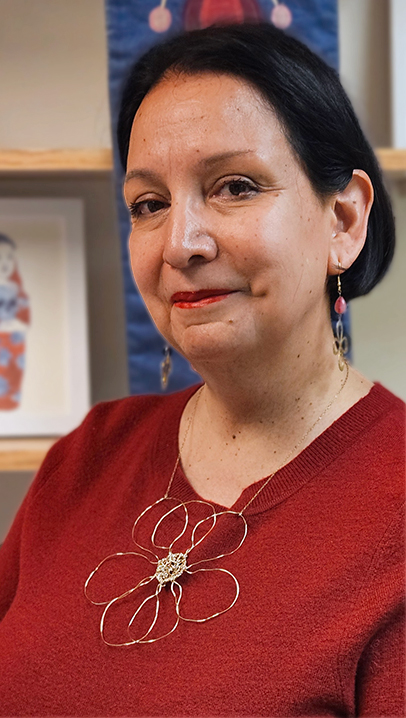KCC Ovations
Kingsborough Community College Anthropologist Awarded Prestigious Bodleian Visiting Fellowship

Dr. Luz Martin Del Campo, a doctoral lecturer in anthropology at Kingsborough Community College, has been awarded the prestigious David Walker Memorial Fellowship in Early Modern History at the University of Oxford's Bodleian Libraries for the 2024–2025 academic year. She is the first person from the entire City University of New York (CUNY) system to receive this honor.
Each year, the Bodleian Libraries award approximately 25 researchers worldwide with Bodleian Visiting Fellowships to foster research using their archival, manuscript, and printed book collections. Martin Del Campo will spend one month, from October 14 to November 14, 2024, at the Weston Library for Special Collections in England, researching "The Lacandón Rainforest-Indigenous Vernacular Environmental Maps and Tree (Yaxché) Symbolism in Lacanjá Chansayab, Chiapas, México." She will be able to extend her research time in England to January 1, 2025, thanks to a PSC-CUNY research award.
Martin Del Campo's plans to investigate how Maya tree symbolism, land use, and landscape beliefs play a significant role in creating Indigenous vernacular environmental maps among the Lacandón Maya in the Lacandón Rainforest in Chiapas, México. Her work will contribute to the study of indigenous vernacular environmental cartography by mapping and translating landscape signs within the rainforest.
“For the Maya denizens of Lacanjá Chansayab, México, maps were not items you carried in your hands or read on physical signs. Instead, they took form as memories anchored in the landscape and read by identifying specific tree (yaxché) walkthrough markers, milpas (agricultural plots), and streams,” she explained. “Each natural attribute defined the various locations of places and spaces and indicated ancestral land boundaries. Lacandón Maya landscape maps existing in southern México have traditionally been overlooked since cartographic markers in the land have been rendered invisible to outsiders.”
“The Bodleian Special Collections Map Room collaboration is essential in advancing my research project by providing me with the Méxican topographic and, when available, GIS maps, along with the pre- and post-colonial times literature needed to combine my landscape research to further investigate how, where, and why indigenous vernacular environmental maps were created and used by the Lacandón Maya communities in the Lacandón Rainforest.”
Access to the Codex Mendoza, an Aztec codex created circa 1541 and kept at the Bodleian Libraries since 1659, will be crucial to her research as well. Named for Antonio de Mendoza, the first viceroy of New Spain, the codex was produced by native scribes and painters under the supervision of Spanish authorities. It is a graphic and literary record of pre-Columbian Aztec history, rulers, conquests, daily life, and the tribute system.
"Having access to the Codex Mendoza could provide a window into whether traditional pictograms from Central México have landscape markers similar to these, and whether these markers can be viewed and interpreted as native vernacular environmental maps," she enthused.
“The chance to combine a real-world work opportunity with my passion for scholarship is exciting. That my scholarship can contribute to the expanding fields of environmental sustainability and cartography is a blessing," she concluded.
For more information about the Bodleian Visiting Fellowships, visit https://www.bodleian.ox.ac.uk/csb/fellowships.
